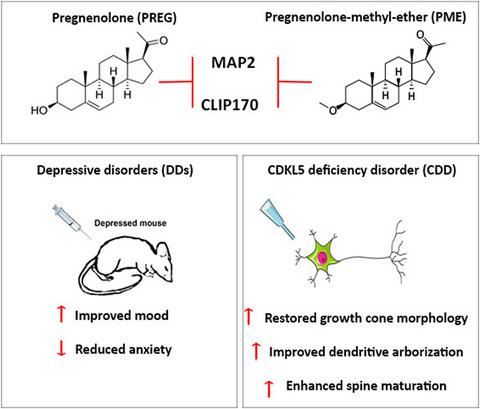当前位置:
X-MOL 学术
›
J. Neuroendocrinol.
›
论文详情
Our official English website, www.x-mol.net, welcomes your
feedback! (Note: you will need to create a separate account there.)
Therapeutic potential of pregnenolone and pregnenolone methyl ether on depressive and CDKL5 deficiency disorders: Focus on microtubule targeting
Journal of Neuroendocrinology ( IF 3.3 ) Pub Date : 2021-08-19 , DOI: 10.1111/jne.13033 Isabella Barbiero 1 , Massimiliano Bianchi 2, 3 , Charlotte Kilstrup-Nielsen 1
Journal of Neuroendocrinology ( IF 3.3 ) Pub Date : 2021-08-19 , DOI: 10.1111/jne.13033 Isabella Barbiero 1 , Massimiliano Bianchi 2, 3 , Charlotte Kilstrup-Nielsen 1
Affiliation

|
Pregnenolone methyl-ether (PME) is a synthetic derivative of the endogenous neuroactive steroid pregnenolone (PREG), which is an important modulator of several brain functions. In addition to being the precursor of steroids, PREG acts directly on various targets including microtubules (MTs), the functioning of which is fundamental for the development and homeostasis of nervous system. The coordination of MT dynamics is supported by a plethora of MT-associated proteins (MAPs) and by a specific MT code that is defined by the post-translational modifications of tubulin. Defects associated with MAPs or tubulin post-translational modifications are linked to different neurological pathologies including mood and neurodevelopmental disorders. In this review, we describe the beneficial effect of PME in major depressive disorders (MDDs) and in CDKL5 deficiency disorder (CDD), two pathologies that are joint by defective MT dynamics. Growing evidence indeed suggests that PME, as well as PREG, is able to positively affect the MT-binding of MAP2 and the plus-end tracking protein CLIP170 that are both found to be deregulated in the above mentioned pathologies. Furthermore, PME influences the state of MT acetylation, the deregulation of which is often associated with neurological abnormalities including MDDs. By contrast to PREG, PME is not metabolised into other downstream molecules with specific biological properties, an aspect that makes this compound more suitable for therapeutic strategies. Thus, through the analysis of MDDs and CDD, this work focuses attention on the possible use of PME for neuronal pathologies associated with MT defects.
中文翻译:

孕烯醇酮和孕烯醇酮甲醚对抑郁症和 CDKL5 缺乏症的治疗潜力:专注于微管靶向
孕烯醇酮甲醚 (PME) 是内源性神经活性类固醇孕烯醇酮 (PREG) 的合成衍生物,它是多种脑功能的重要调节剂。除了作为类固醇的前体外,PREG 还直接作用于包括微管 (MT) 在内的各种靶标,其功能对于神经系统的发育和稳态至关重要。大量 MT 相关蛋白 (MAP) 和由微管蛋白的翻译后修饰定义的特定 MT 代码支持 MT 动力学的协调。与 MAP 或微管蛋白翻译后修饰相关的缺陷与不同的神经病理学有关,包括情绪和神经发育障碍。在这篇评论中,我们描述了 PME 在重度抑郁症 (MDD) 和 CDKL5 缺乏症 (CDD) 中的有益作用,这两种病理由有缺陷的 MT 动力学联合。越来越多的证据确实表明 PME 和 PREG 能够积极影响 MAP2 和加端跟踪蛋白 CLIP170 的 MT 结合,这两种蛋白在上述病理中都被发现失调。此外,PME 影响 MT 乙酰化状态,其失调通常与包括 MDD 在内的神经系统异常有关。与 PREG 相比,PME 不会代谢成其他具有特定生物学特性的下游分子,这使得该化合物更适合治疗策略。因此,通过对 MDDs 和 CDD 的分析,
更新日期:2021-08-19
中文翻译:

孕烯醇酮和孕烯醇酮甲醚对抑郁症和 CDKL5 缺乏症的治疗潜力:专注于微管靶向
孕烯醇酮甲醚 (PME) 是内源性神经活性类固醇孕烯醇酮 (PREG) 的合成衍生物,它是多种脑功能的重要调节剂。除了作为类固醇的前体外,PREG 还直接作用于包括微管 (MT) 在内的各种靶标,其功能对于神经系统的发育和稳态至关重要。大量 MT 相关蛋白 (MAP) 和由微管蛋白的翻译后修饰定义的特定 MT 代码支持 MT 动力学的协调。与 MAP 或微管蛋白翻译后修饰相关的缺陷与不同的神经病理学有关,包括情绪和神经发育障碍。在这篇评论中,我们描述了 PME 在重度抑郁症 (MDD) 和 CDKL5 缺乏症 (CDD) 中的有益作用,这两种病理由有缺陷的 MT 动力学联合。越来越多的证据确实表明 PME 和 PREG 能够积极影响 MAP2 和加端跟踪蛋白 CLIP170 的 MT 结合,这两种蛋白在上述病理中都被发现失调。此外,PME 影响 MT 乙酰化状态,其失调通常与包括 MDD 在内的神经系统异常有关。与 PREG 相比,PME 不会代谢成其他具有特定生物学特性的下游分子,这使得该化合物更适合治疗策略。因此,通过对 MDDs 和 CDD 的分析,











































 京公网安备 11010802027423号
京公网安备 11010802027423号